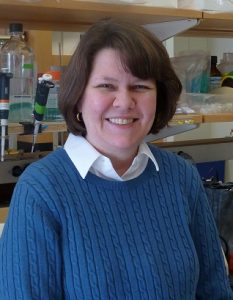Award
- 2014 - Pilot Grant
Specific Aims
Thyroid hormone levels can be changed locally within a specific cell type or tissue, independently of serum thyroid hormone concentrations, by alterations in the iodothyronine deiodinase enzymes that activate and inactivate thyroid hormone. Previous work has shown that these principles can be applied to skeletal muscle during injury, with cell-specific increases in the thyroid hormone activating deiodinase, type 2 deiodinase (D2) leading to increased T3 in muscle stem cells (also called satellite cells) that is crucial for a normal program of muscle regeneration.
Using our D2KO mouse model, our group found that a loss of D2 leads to a significant delay in the regeneration of injured muscle, with an increased number of satellite cells at 15 days post-injury 1,2. Surprisingly, when we tried to translate these findings to a satellite cell transplantation model we saw significantly lower formation of myofibers derived from engrafted D2KO satellite cells, and no evidence of increased satellite cell proliferation (see preliminary results).
Further investigation into the potential causes for this led to the novel identification of D2 in another component of the stem cell niche, the fibro/adipogenic precursor cells (FAPs). These cells provide pro-myogenic signals to the muscle stem cells upon injury, and also are the source of the adipocytes and fibroblasts associated with fatty degeneration and fibrosis in dystrophic muscle (reviewed in 3). This led us to the hypothesis that local thyroid hormone metabolism in FAPs plays an important role in muscle regeneration after injury by contributing to the production of pro-myogenic signals from the FAPs targeting the muscle stem cell. We will test this hypothesis with the following experimental Aims:
Specific Aim 1. Evaluate the role of D2 in the generation of pro-myogenic signals by FAPs after muscle injury. In this Aim we will initially determine if D2 expression levels change with injury in FAPs, and use a co-culture model to evaluate if the loss of D2 results in changes in the production of pro-myogenic signals by the FAPs. We will also perform microarray analysis to define novel genes that are differentially expressed between WT and D2KO FAPs during muscle injury.
Specific Aim 2. Assessment of engraftment potential of WT muscle stem cells into the D2KO in muscle stem cell niche. Here we will transplant WT satellite cells into an injured D2KO recipient and determine if a loss of D2 in the muscle stem cell niche will effect engraftment potential.
References
1. Dentice M, Marsili A, Ambrosio R, Guardiola O, Sibilio A, Paik J-H, Minchiotti G, DePinho RA, Fenzi G, Larsen PR, Salvatore D 2010 Amplification of thyroid hormone signaling by the FoxO3-Type 2 deiodinase axis is required for normal myogenesis and muscle regeneration. J Clin Invest 120:4021-4030
2. Marsili A, Tang D, Harney JW, Singh P, Zavacki AM, Dentice M, Salvatore D, Larsen PR 2011 Type II iodothyronine deiodinase provides intracellular 3,5,3′-triiodothyronine to normal and regenerating mouse skeletal muscle. Am J Physiol Endocrinol Metab 301:E818-824
3. Judson RN, Zhang RH, Rossi FM 2013 Tissue-resident mesenchymal stem/progenitor cells in skeletal muscle: collaborators or saboteurs? FEBS J 280:4100-4108
4. Murphy MM, Lawson JA, Mathew SJ, Hutcheson DA, Kardon G 2011 Satellite cells, connective tissue fibroblasts and their interactions are crucial for muscle regeneration. Development 138:3625-3637
Outcomes
Further funding secured:
Physiology of Thyroid Hormone-Dependent Gene Expression
5R01DK044128-25
National Institute of Diabetes and Digestive And Kidney Diseases (NIH/NIDDK)
(2018)
The Role of Local Thyroid Hormone Concentration in the Beneficial Effects of Stretching
Brigham and Women’s Hospital, Department of Medicine Evergreen Award
(collaboration with Dr. Helene Langevin’s Connective Tissue Lab).
(2017)
Brigham Research Institute Fund to Sustain Research Excellence
(2015)








